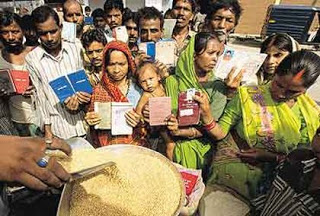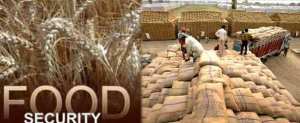Food security bill is the latest burning issue of Indian politics. There is no denying the fact that food security is the first basic big element in the chain of value addition in the earning ability of an individual, his health and India’s march towards poverty alleviation.
The bill aims to provide subsidized food grain to around 67% of India’s 130 crores people. As per the provisions of the bill, beneficiaries would get rice at Rs. 3/kg, wheat at Rs. 2/kg, and coarse grains at Rs. 1/kg. All mentioned rates would be valid for the three years. Every pregnant woman would get free meal during pregnancy till six months after the child birth along with this they would also get a maternity benefit of Rs 6,000 in parts. Children up to the age of 14 would get free meals. In case of any failure in supply of food grains, the states will have to pay the food security allowance to beneficiaries.
Food subsidy bill talks in terms of providing food to 50% of urban India (377 million) and 75% of rural India ( 833 million) at highly subsidized rates at a whopping cost of Rs 1300 billions to the exchequer. Along with this Rs. 160-170 billions, the cost of logistics inefficiencies , grain rotting and theft. So, total cost of 2000 billions (approx) for meeting the basic food requirements of 800 million of Indian after 66 years of freedom from british and rule by politicians.

President Pratibha Patil on June 4, 2009 said that a National Food Security Act would be formulated. The National Advisory Council (NAC), which is headed by Sonia Gandhi, has finalised its draft of the Food Security Bill. S. Gandhi will forward this document to the Prime Minister. The historic Food Security Bill entitles 75% of India’s population to highly-subsidized food grains.
The Bill says households of two types are eligible for discounted grain under Food Security Bill – “priority households” which are below poverty line (BPL); and the “general households” which consist of Lower Middle Class families.
Priority households (below BPL) are entitled to 35 kilograms per month of foodgrains at the discounted rates of Rs. 3/2/1 for Rice/wheat/millets respectively. General households have the right to 20 kilograms at a price not exceeding 50% of the Minimum Support Price paid to farmers for the three grains.
What is food Security Act?
 It was one of the political agenda of congress during there 2004 and 2009 elections. Food security is a proposed act which makes food availability a right for every citizen of India. It aims to give common man to lead a healthy and productive life. Antyodaya Anna Yojana (AAY) is a centrally sponsored scheme launched on December 2000 for one crore of the poorest families. It is on the look out for the ‘poorest of the poor’ by providing them 35 kilos of rice and wheat at Rs.2 per kg. Whereas the National Food Security Act helps the poor to purchase 25 kg of rice or wheat per month at Rs.3 per kg. It calls for broader reforms in the public distribution system. Food Security Act takes into consideration the following three important aspects:
It was one of the political agenda of congress during there 2004 and 2009 elections. Food security is a proposed act which makes food availability a right for every citizen of India. It aims to give common man to lead a healthy and productive life. Antyodaya Anna Yojana (AAY) is a centrally sponsored scheme launched on December 2000 for one crore of the poorest families. It is on the look out for the ‘poorest of the poor’ by providing them 35 kilos of rice and wheat at Rs.2 per kg. Whereas the National Food Security Act helps the poor to purchase 25 kg of rice or wheat per month at Rs.3 per kg. It calls for broader reforms in the public distribution system. Food Security Act takes into consideration the following three important aspects:-
Food Availability.
-
Food Access.
- Food Absorption.
- 46% of rural households and 38% of urban households are entitled to the lowest rates; together, they add upto 40% of India’s total population.
- Coverage of two thirds population to get highly subsidized foodgrains
- Up to three-quarters of people in the rural areas and up to half of the urban population would get five kilograms of grains per month at subsidized prices (3 rupees per kilo for rice, 2 rupees per kilo for wheat and 1 rupee per kilo for coarse grains).
- The poorest households would continue to receive 35 kilograms of grains per month under the “Antyodaya Anna Yojana” at subsidized prices.
- Special focus on nutritional support to women and children
- Provision of providing Food Security Allowance by Central Government in case of non supply of foodgrains.

